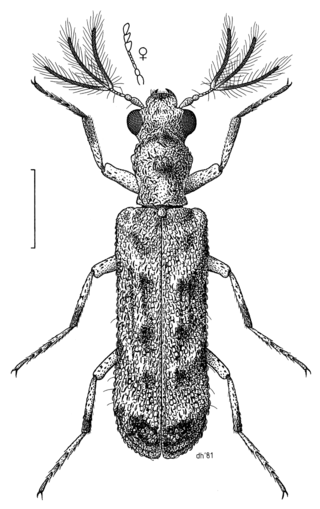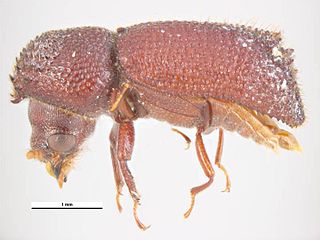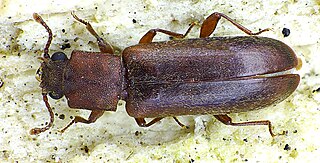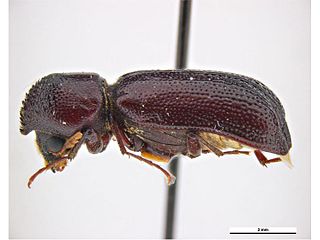
Bostrichoidea is a superfamily of beetles. It is the type superfamily of the infraorder Bostrichiformia.

Powderpost beetles are a group of seventy species of woodboring beetles classified in the insect subfamily Lyctinae. These beetles, along with spider beetles, death watch beetles, common furniture beetles, skin beetles, and others, make up the superfamily Bostrichoidea. While most woodborers have a large prothorax, powderpost beetles do not, making their heads more visible. In addition to this, their antennae have two-jointed clubs. They are considered pests and attack deciduous trees, over time reducing the wood to a powdery dust. The damage caused by longhorn beetles is often confused with that of powderpost beetles, but the two groups are unrelated. The larvae of the Cerambycidae are white, straight and generally flat-headed, whereas those of the Bostrichidae are white and C-shaped.

European lyctus beetle is a species of beetle in the family Bostrichidae. It is a member of the subfamily Lyctinae, the powderpost beetles. It was originally native to tropical regions, but it can now be found worldwide. It is a common pest of wood and wood products and it is transported around the world with them. It is most common in deciduous tree woods.

The Bostrichidae are a family of beetles with more than 700 described species. They are commonly called auger beetles, false powderpost beetles, or horned powderpost beetles. The head of most auger beetles cannot be seen from above, as it is downwardly directed and hidden by the thorax. Exceptions are the powderpost beetles, and members of the subfamily Psoinae.

Ptinidae is a family of beetles in the superfamily Bostrichoidea. There are at least 220 genera and 2,200 described species in Ptinidae worldwide. The family includes spider beetles and deathwatch beetles.

Xyletininae is a subfamily of death-watch and spider beetles in the family Ptinidae. There are about 13 genera and at least 170 described species in Xyletininae.

Dorcatominae is a subfamily of death-watch and spider beetles in the family Ptinidae. There are about 16 genera and at least 190 described species in Dorcatominae.

Eucradinae is a subfamily of death-watch and spider beetles in the family Ptinidae. There are at least 5 genera and about 18 described species in Eucradinae.

Mesocoelopodinae is a subfamily of death-watch and spider beetles in the family Ptinidae. There are at least 4 genera and 100 described species in Mesocoelopodinae.

The Dinoderinae comprise a subfamily of the beetle family Bostrichidae. There are five to seven genera. They live in wood. Some species are known as pests of wood-based and other stored products.

Dysidinae is a subfamily of beetles.

Lyctus brunneus is a xylophage (wood-eating) insect a species of beetle in the family Bostrichidae. It is a member of the subfamily Lyctinae, the powderpost beetles. It is known commonly as the brown powderpost beetle or brown lyctus beetle.

Lyctus suturalis is a species of beetles in the family Bostrichidae, present in the Palearctic and the Near East. In Europe, it is only found in Belarus and Ukraine.

Trogoxylon is a genus of beetles in the family Bostrichidae. They are members of the subfamily Lyctinae, the powderpost beetles.

Psoinae is a small subfamily of beetles in the family Bostrichidae.

Lyctus carbonarius is a wood-boring beetle in the family Bostrichidae, commonly known as the southern lyctus beetle or lyctid powderpost beetle. It is a serious pest of hardwoods including ash, hickory, oak, maple and mahogany and can infest many products in the home including hardwood flooring and structural timbers, plywood, furniture, tool handles, picture frames, baskets and ladders. Timber can be infested in one location and then be transported large distances by ship, after which the beetles can emerge and spread the infestation to new areas.

Micrapate bilobata is a species of horned powder-post beetle in the family Bostrichidae. It is found in North America.

Bostrichini is a tribe of horned powder-post beetles in the family Bostrichidae. There are about 16 genera and at least 150 described species in Bostrichini.

Polycaon is a genus of horned powder-post beetles in the family Bostrichidae. There are at least four described species in Polycaon.

Amphicerus simplex is a species of horned powder-post beetle in the family Bostrichidae. It is found in North America.



















